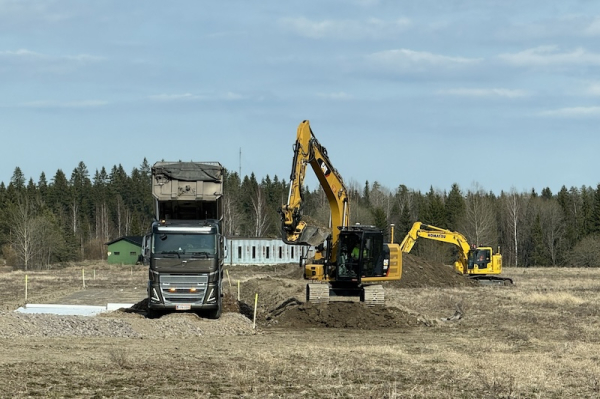
Earthmoving work at the site of TikTok’s data centre in Koria, Kouvola, on 16 April 2025. The Finnish real estate investment company Hyperco Oy is building the data centre, with social media platform TikTok set to be its main user. Photo: Sasu Järnstedt / Str / Lehtikuva
- Next Article Finland plans to raise reservist age limit to 65
The number of data centres in Finland is rising fast, with at least 15 new projects already underway this year. Last year saw 22 new centres launched, according to the Confederation of Finnish Industries.
The most talked-about project is in Kouvola. The company behind the centre, Hyperco, has confirmed that its primary client will be Chinese social media platform TikTok. The announcement triggered concern among some Finnish officials, particularly over ownership and data security.
Despite the controversy, data centres continue to multiply across the country. Blueprints for new facilities cover much of southern and central Finland, with the trend expected to continue.
Data centres store and process the majority of global internet content. Everything from streaming video to social media and news relies on them. Ari Ihatsu, who manages a data centre for telecoms firm Telia, described the internet as a network between these hubs.
Without data centres, the internet does not work, Ihatsu said.
Finland has become a target for global tech infrastructure due to three key factors. Electricity is comparatively cheap, despite daily fluctuations. The cool climate helps reduce the energy needed for cooling. And the waste heat generated can be used to warm nearby homes through district heating.
Data centres use large volumes of electricity. Yet according to Asta Sihvonen-Punkka, CEO of national grid operator Fingrid, individual centres do not have a direct impact on national electricity prices. She noted that broader price trends remain hard to predict due to the reliance on renewable , have reported that the emissions from data centres may be underreported by the companies operating them.
Financially, the benefits for Finland are limited. Jouni Salonen, senior advisor at Business Finland, estimates that just 20 to 30 percent of the revenue from large-scale data projects stays in the country. Most funds are reinvested by the companies in acquiring more servers and expanding operations elsewhere.
The number of permanent jobs created is also low. Technical and maintenance tasks exist, but much of the work, including systems management, can be done remotely, sometimes from other countries.
Ownership has emerged as a focal point in the Kouvola case. Reports by Yle and Kauppalehti revealed that Hyperco is no longer Finnish-owned. Nearly 40 percent of its shares are held by Huang Wei, a Chinese businessman. The second largest stake belongs to Hussain Sajwan, a Dubai-based billionaire with known ties to Donald Trump.
Minister for Economic Affairs Wille Rydman (Finns Party) said the ownership structure and Hyperco’s communication had not eased national security concerns. He warned that the project could allow China to sidestep restrictions on AI processor exports, posing a risk to Finland’s relationship with the United States.
Prime Minister Petteri Orpo (National Coalition Party) dismissed those concerns. Defence Minister Antti Häkkänen also supported the Ministry of Defence’s approval of the centre.
The broader trend suggests that data centres will continue to expand in Finland, with or without clear answers to questions about their benefits, costs, and long-term security implications.
HT
- Next Article Finland plans to raise reservist age limit to 65
Source: www.helsinkitimes.fi
